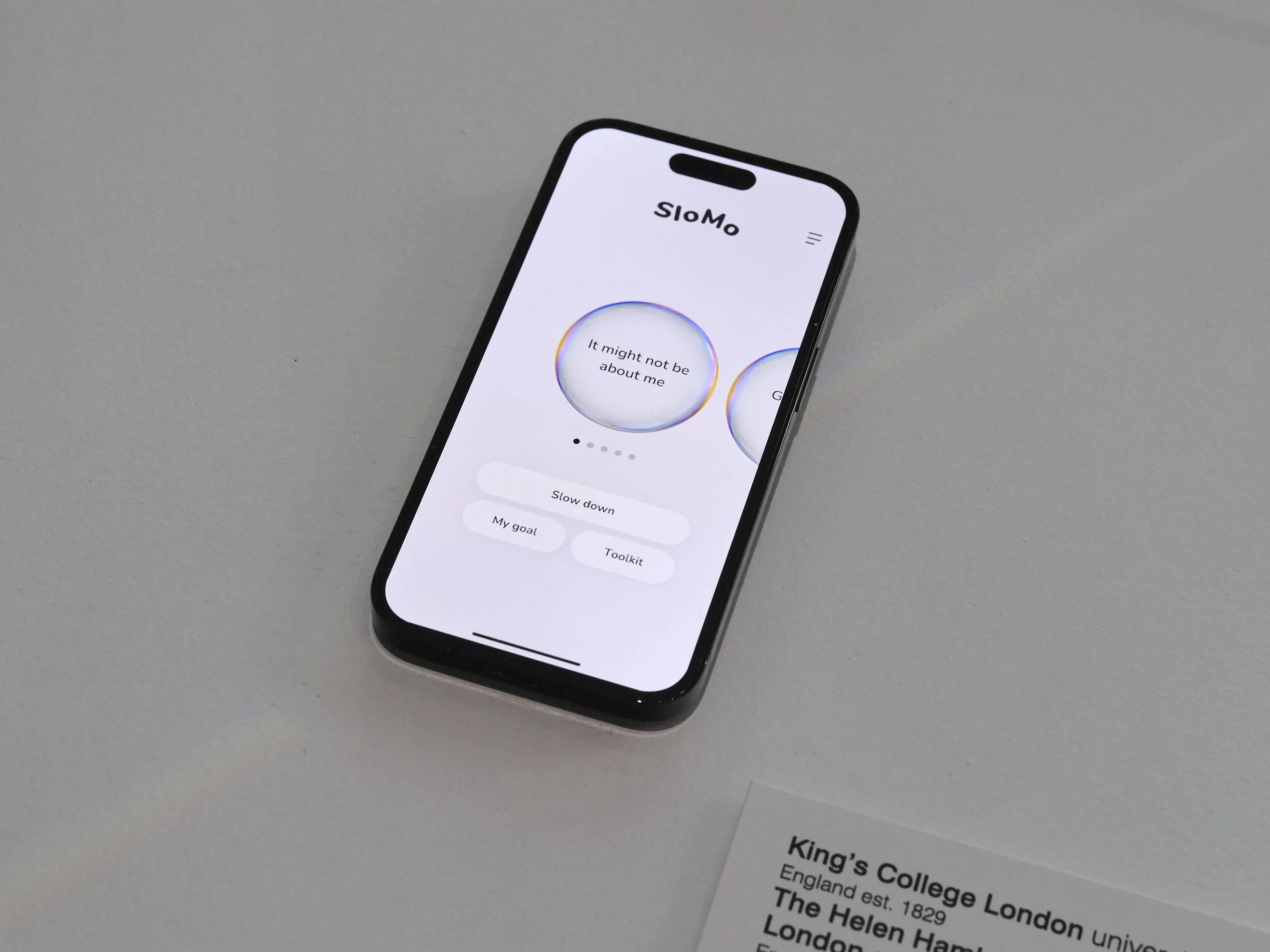SloMo was created with and for people living with psychosis. Its recognition by the NGV highlights the importance of inclusive design in supporting mental health and tackling inequalities in treatment access, experience and outcomes.
Dr Amy Hardy, Reader in Clinical Psychology at the IoPPN and co-founder of SloMo
12 September 2025
SloMo featured in National Gallery of Victoria exhibition
The digital therapy for paranoia in psychosis was spotlighted for its inclusive, people-centred design.

SloMo, an inclusive digital therapy for paranoia in psychosis developed at King’s College London, featured in the National Gallery of Victoria’s (NGV) exhibition Making Good: Redesigning the Everyday.
The exhibition, which opened on 29 August 2025 at the Ian Potter Centre in Melbourne, showcases more than 50 designers from Australia and around the world whose work improves the health and wellbeing of society and the environment.

About SloMo
SloMo is the first UK Conformity Assessed (UKCA) marked digital therapy for paranoia. Developed in 2014 by Dr Amy Hardy, Dr Thomas Ward and Professor Philippa Garety at the Institute of Psychiatry, Psychology & Neuroscience (IoPPN) in close collaboration with people with lived experience of psychosis, it has been shown to be safe, effective, and engaging in the largest clinical trial of its kind.
The platform supports people during in-person therapy sessions and in their day-to-day lives. By visualising thoughts as spinning bubbles, with fast, grey bubbles representing unhelpful “fast thinking” and slower, colourful bubbles supporting calmer, safer thinking patterns, SloMo helps users reduce worries and improve quality of life.
Research and impact to date
The 2021 clinical trial found robust evidence that SloMo reduced worries and improved wellbeing, with effects lasting at least six months. Importantly, it also demonstrated that SloMo helped overcome the “digital divide”, with strong outcomes for marginalised groups often excluded from digital innovation.
Building on this success, the National Institute for Health and Care Excellence (NICE) issued an Early Value Assessment in 2024, recommending SloMo for use in the NHS to support real world evaluation of its implementation.
The ongoing SloMo2 study is now testing its implementation, effectiveness and cost-effectiveness in routine NHS care. If successful, this will support SloMo’s scale-up in the NHS and internationally.
The NICE Early Value Assessment was a significant milestone in our aim to make SloMo an accessible and effective treatment option within the NHS. We now need to demonstrate SloMo can deliver the same powerful outcomes when delivered in routine clinical services that we have seen in our clinical research.
Dr Thomas Ward, Clinical Psychologist Lecturer at the IoPPN and co-founder of SloMo
Designing SloMo
The original SloMo platform was designed by the Helen Hamlyn Centre for Design – the Royal College of Art's largest and longest-running centre for design research. Anna Wojdecka and team worked alongside clinicians, technologists and people with lived experience of psychosis to develop an inclusive platform.
In recent years, the design studio Special Projects has refined the platform to support its rollout in frontline health services. The London-based studio, founded in 2014 by Adrian and Clara Westaway, is known for creating human-centred design solutions across health, technology and consumer sectors.
Embracing an inclusive design approach involved leading with a people-centred, empathy-driven inquiry to enhance accessibility and usability of SloMo for those who need it most. This approach fosters stakeholder involvement at every stage of development, focusing on addressing the needs of the broadest range of users, including diverse perspectives and needs, throughout the design process.
Dr Melanie Flory, Associate Director Research, Helen Hamlyn Centre for Design, Royal College of Art
More information
The exhibition runs from 29 August 2025 to 1 February 2026 at the NGV Ian Potter Centre in Melbourne, Australia.
For more information about SloMo, please contact Milly Remmington (School of Mental Health & Psychological Sciences Communications Manager).



